- A dose of compassion
- Waterloo, Strathclyde issue joint transatlantic funding call
- Nominations now open for the Award of Excellence in Graduate Supervision
- New AI can predict virus mutations and help create more effective treatments
- Cybersecurity awareness: get your back up
- Your Daily Inspiration continues, a disordered cosmos, and other notes
Editor:
Brandon Sweet
University Communications
bulletin@uwaterloo.ca
A dose of compassion

A message from the Office of Advancement.
When a beloved Pharmacy instructor passed away, her colleagues created an award in her memory. Today, that award recognizes compassionate students like Lisa Ros-Choi, who are making a difference for individual patients — and health care as a whole.
In the 2020-21 Report on Giving, you’ll find more stories about donors who are helping Waterloo build the talent Canada needs – and lighting the way to a better future for us all.
Waterloo, Strathclyde issue joint transatlantic funding call

A message from Waterloo International.
The newly formed ‘Strathclyde and Waterloo Joint Transatlantic Funding Call’ has been issued between the University of Strathclyde in the United Kingdom and the University of Waterloo. The call aims to catalyze collaborative work between respective members and advance the two universities’ strategic plans through research, learning, service, or other priority areas. This call is aimed both at those who are looking to initiate collaboration, as well as those who want to further advance existing collaborations.
Supported activities can be exploratory, including detailed investigation of collaboration / workshops / possible visits / undertaking any minor preparatory research or background work, attendance at virtual conferences, project management support, etc. They could also aim to explore external funding opportunities, jointly or in parallel to our respective national organizations.
It is anticipated that approximately five awards will be made. Each award will be co-funded by the two universities, with each university’s resources supporting their particular members’ involvement. The maximum value of each award will be a sum of no more than C$20,000 and UK £12,000 by each respective university. Complete applications are due Friday at 6:00 p.m. on 26 November 2021. Further details regarding the priorities, the scope, the mechanics, and the application full details are on the website.
Strathclyde and Waterloo have built, over the past decade, a strong partnership based upon shared interests in research for impact, outstanding student experience, and societal connections. This call aims to augment the two universities’ impact through increased collaboration.
Nominations now open for the Award of Excellence in Graduate Supervision
A message from Graduate Studies and Postdoctoral Affairs (GSPA).
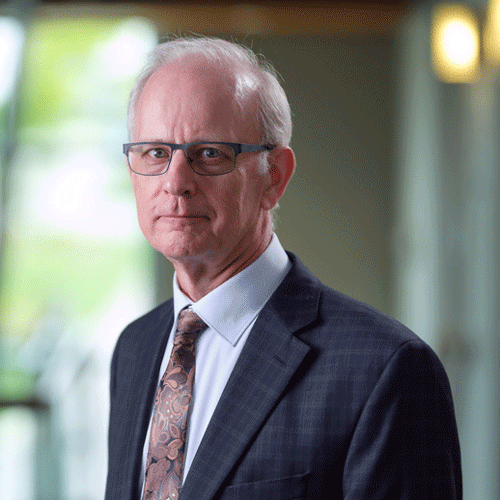
Professor Paul Stolee was one of the winners of the Award of Excellence in Graduate Supervision in 2020-2021.
Graduate Studies and Postdoctoral Affairs (GSPA), in collaboration with the Graduate Student Association (GSA), established this award to recognize exemplary faculty members who have demonstrated excellence in graduate student supervision, through being a mentor, advisor, role model, humanist and a strategist who exemplifies a high level of energy and ingenuity.
Nominations are initiated by a current or former graduate student who is/was directly supervised by the faculty member. Recipients of this prestigious award receive $1,000 (taxable) and are recognized at convocation.
The nomination deadline is November 12.
New AI can predict virus mutations and help create more effective treatments

Researchers have developed a new method that uses artificial intelligence to foresee the most likely mutations of pathogens like SARS-COV-2, the virus that causes COVID-19.
The new research has implications for the rapid development of vaccines, treatments and diagnostic tests that would be much less likely to be impacted by new or emerging variants of concern.
Mohammad Kohandel, a professor and head of the Mathematical Medicine Laboratory in the Department of Applied Mathematics at the University of Waterloo, helped pioneer the research in the context of the ongoing pandemic.
“With a highly infectious pathogen like SARS-COV-2, we want to have a method for extracting the mutational information as quickly as possible,” Kohandel said. “Variants are a huge problem because we don’t know whether the diagnostic tests that are available are going to work or whether the treatments or vaccines will be effective in the long run.”
Kohandel’s research team initially focused on using a single ancestral sequence to identify the parts of the viral genome that are not significantly affected by mutations. These are the so-called “conserved” part of the virus.
Identifying the conserved parts of a pathogen is valuable because even if there are mutations, it will not impact the efficacy of vaccines, treatments or tests that work by targeting those stable pieces.
“Imagine that from the beginning of the pandemic, we knew exactly which parts of the genome were going to be stable and which ones would likely change,” said Amirhossein Darooneh, a member of the research team and a professor in applied mathematics at Waterloo. “Everything would be different right now.
“Now that we have so much data on the sequencing of SARS-COV2 and its variants, we are able to use all that information to train a neural network to predict the most likely mutations of the genome. Our AI can predict the mutations that happened with really high accuracy.”
After identifying the conserved parts, the team trained an AI to anticipate the mutations that would occur in a pathogen. The machine learning program assessed millions of genomic sequences as part of its training process. The AI was then tested on the genomic sequence of the original strain of coronavirus.
Based on its analysis of the original virus, the AI predicted and identified the variants that came to be known as alpha, beta, gamma, delta and other variants of concern as most likely mutable regions of the genome. Had this information been available at the early stages of the pandemic and when vaccines were first being developed, it could have led to more effective tests and vaccines that were much more resilient against current variants.
Along with its impacts on the pandemic, the new technology can also contribute to other medical treatments.
“Even with cancer, we should be able to identify the therapeutic targets for overcoming mutation-driven drug resistance,” said Michelle Przedborski, another of the team members and a professor of applied mathematics at Waterloo. “Lots of drugs are targeting a specific part of the protein in cancer cells. But if there are mutations in those, then drugs wouldn’t be effective anymore. We can apply the same analysis and AI method to other pathogens.”
Kohandel, Darooneh and Przedborski are working towards commercializing their AI-based software for pathogen mutation prediction with the University of Waterloo Commercialization Office (WatCo).
Cybersecurity awareness: get your back up

A message from Information Systems & Technology (IST). October is Cybersecurity Awareness Month, and the UW Information Security Services team will be bringing you some simple hints to allow you to be cyber secure.
Imagine the loss of your valued research data, course plans, recordings, or documents. A computer failure, a ransomware attack, or a house fire could wipe these out in seconds. Be prepared by keeping backup copies of important files.
A common recommendation is to follow the 3-2-1 rule for data backups. Keep 3 copies of files, storing 2 of them on different storage media, and with 1 copy located in a different location.
You may want to save files to external hard drives or USB keys and store those in a safe location away from your home or office.
You should also test your backups periodically to ensure that you can recover your files from them.
Your Daily Inspiration continues, a disordered cosmos, and other notes
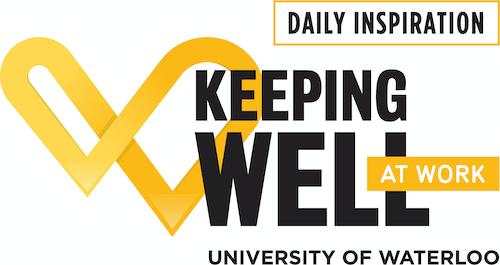
Today's Daily Inspiration
Who doesn’t love a comfortable, restful, perfectly timed sleep?
Quality sleep is as important to your health as diet, nutrition and exercise. Regardless of one’s age, the right amount and quality of sleep improves attention, behaviour, memory, and overall mental and physical health.
Think your sleep habits need a makeover? These resources might help.
- The Impact of Sleep on your Health
- Campus Wellness' 15-minute sleep workshop (not just for students)
See all Daily Inspirations on the Keeping Well at Work conference site. Questions and contest entries can be sent to ohd@uwaterloo.ca or tweet @OHDuwaterloo.
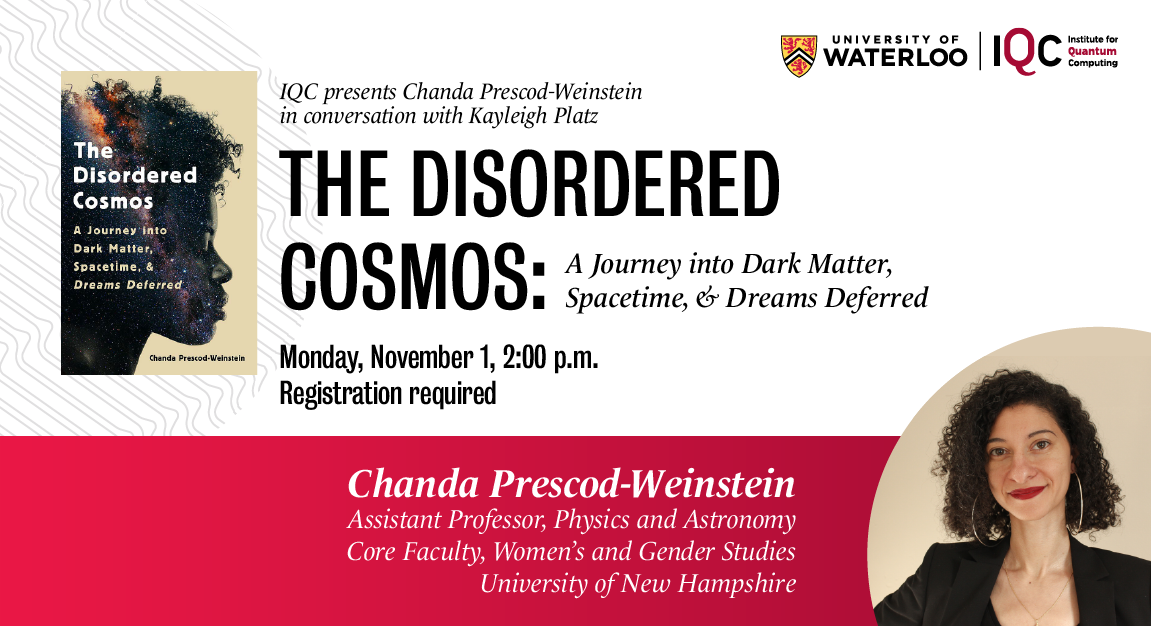
On November 1, the Institute for Quantum Computing (IQC) is presenting Chanda Prescod-Weinstein in conversation with Kayleigh Platz In The Disordered Cosmos: A Journey into Dark Matter, Spacetime, & Dreams Deferred. In this talk, Professor Chanda Prescod-Weinstein shares her love for physics, from the Standard Model of Particle Physics and what lies beyond it, to the physics of melanin in skin, to the latest theories of dark matter—all with a new spin informed by history, politics, and the wisdom of Star Trek. Join IQC virtually to hear Prescod-Weinstein discuss her debut book with Kayleigh Platz.
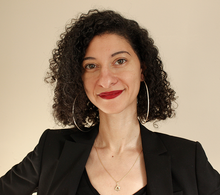
Chanda Prescod-Weinstein is an assistant professor of physics and astronomy and core faculty in women’s and gender studies at the University of New Hampshire. Originally from East L.A., Dr. Prescod-Weinstein is a graduate of Harvard College, University of California — Santa Cruz, and the University of Waterloo. One of under 100 Black American women to earn a PhD from a department of physics, she is a theoretical physicist with expertise in particle physics, cosmology, and astrophysics, with an emphasis on dark matter. In addition, Dr. Prescod-Weinstein is a theorist of Black feminist science, technology, and society studies, and a monthly columnist for New Scientist.
This virtual talk is free, however registration is required. The Disordered Cosmos: A Journey into Dark Matter, Spacetime, and Dreams Deferred is available at W Store.
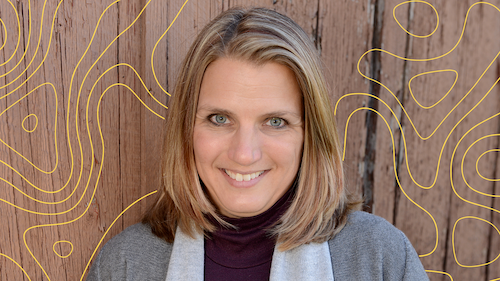
Insights for book lovers and aspiring authors: In the latest episode of Alumni Know, author Carolyn Mills (BA ’00) gives an inside look at the writing and publishing process.
Carolyn spends her days in the classroom, teaching grade seven. But she's also an award-winning writer and author of two books. Her picture book, The Little Boy Who Lived Down the Drain, was published in 2017. And as of March 2021, you can find her debut novel, The Good Son, on library and store bookshelves.
If you're an aspiring author, or just love reading fiction, watch the new episode of Alumni Know for insights about Carolyn's writing process, honing your craft and catching a publisher's attention.
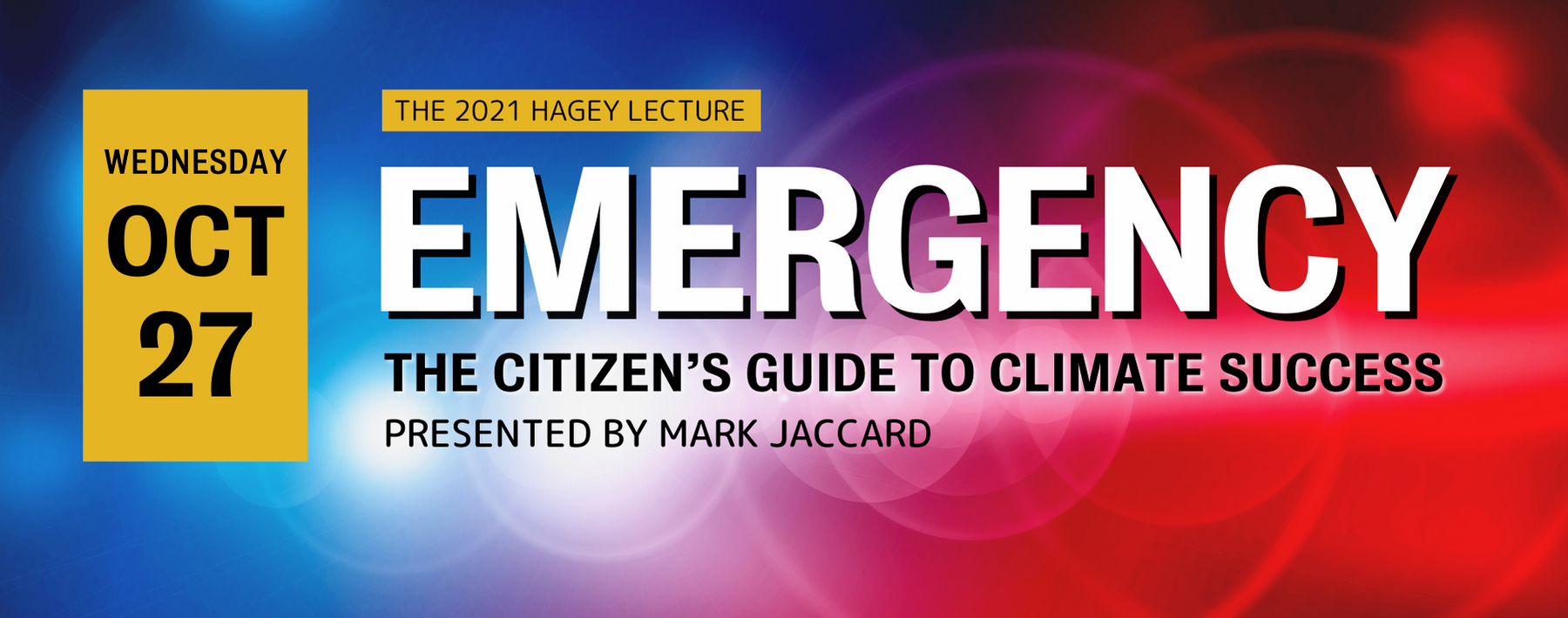
Finally, a reminder that energy economist and author Mark Jaccard will deliver the 2021 University of Waterloo Hagey Lecture tonight at 8:00 p.m. In this talk, Jaccard speaks about how climate-concerned citizens can overcome myths that hinder us from acting in time to prevent extreme climate impacts. Personal and collective efforts to mitigate climate change must align with and foster a global strategy of decarbonization, especially in developing countries. Tune in to find out what is required on a simple path to climate success and what you can contribute.
Register now to watch the livestream.

Mark Jaccard is a professor in the School of Resource and Environmental Management at Simon Fraser University. His PhD is in energy economics from the University of Grenoble, and his research focus is the design and application of energy-economy models for assessing climate policies. Internationally, Mark has served on the IPCC, the China Council for International Cooperation on Environment and Development, and the Global Energy Assessment, and domestically on the National Roundtable on the Environment and the Economy and the Canadian Institute for Climate Choices.
Link of the day
25 musical microgenres that defined the last 25 years
When and Where to get support
Students can visit the Student Success Office online for supports including academic development, international student resources, immigration consulting, leadership development, exchange and study abroad, and opportunities to get involved.
Instructors looking for targeted support for developing online components for blended learning courses, transitioning remote to fully online courses, revising current online courses, and more please visit Agile Development | Centre for Extended Learning | University of Waterloo (uwaterloo.ca).
Instructors can visit the Keep Learning website to get support on adapting their teaching and learning plans for an online environment.
Course templates are available within your course in LEARN to help you build and edit your content and assignment pages quickly.
The following workshops, webinars, and events are offered by the KL team (CTE, CEL, ITMS, LIB):
- Independent Remote Course Design Essentials, self-directed, continuous self-enrollment course in LEARN.
- Independent Blended Course Design (iBlend), self-directed, ongoing
- Copyright Overview for Waterloo Instructors and Staff - self-directed, continuous self-enrollment course in LEARN.
-
Thirty Minute Thursdays– PebblePad – Offered:October 28, November 11, November 18, November 25, 12:00 noon to 12: 30 p.m.
-
Online Instructional Skills Workshop (ISW) (CTE8601), begins on October 22, 8:00 a.m.
-
Getting Ready to Facilitate Online Courses: TA Training, beginning November 1.
Employees can access resources to help them work remotely, including managing University records and privacy of personal information. Here are some tips for staying healthy while working from home.
Stay informed about COVID cases on campus by consulting the COVID case tracker.
The Writing and Communication Centre has virtual services and programs to help undergrads, grad students, postdocs and faculty members with academic writing.
- Meet with writing advisors in one-to-one appointments to brainstorm, draft, revise, and polish. No time for an appointment? Try email tutoring for undergrads.
- Beat isolation and make writing progress at weekly Virtual Writing Cafés for grad students and faculty or PJ-Friendly Writing Groups for Undergrads.
- Take an online workshop or apply to our popular Dissertation Boot Camp program.
- Faculty can request custom in-class workshops for their courses, or the WCC can facilitate any existing workshops for student groups.
Co-op students can get help finding a job and find supports to successfully work remotely, develop new skills, access wellness and career information, and contact a co-op or career advisor.
The Centre for Career Action (CCA) is offering some in-person services for fall 2021. The Tatham Centre is open with front-desk support, limited in-person appointments and co-op consults. Services are also available virtually. Book an appointment online or Live Chat with our Client Support Team. The CCA is here to help.
If you feel overwhelmed or anxious and need to talk to somebody, please contact the University’s Campus Wellness services, either Health Services or Counselling Services. You can also contact the University's Centre for Mental Health Research and Treatment. Good2Talk is a post-secondary student helpline available to all students.
While the Library continues to focus on digital resources and consultations, our spaces are open for the fall term. Dana Porter Library is open Monday to Friday, 9 a.m. to 5 p.m., and Davis Centre Library is open Monday to Friday, 9 a.m. to 11 p.m., and Saturday and Sunday, 11 a.m. to 5 p.m. for drop-in individual study space, bookable individual study rooms, drop-in access to computers and printers, book pick-up services and IST Help Desk support. Special Collections & Archives and the Geospatial Centre will be accessible by appointment. Library staff are available for questions via Ask us. Full details on current services and hours are available on the Library’s COVID-19 Update webpage.
The Faculty Association of the University of Waterloo (FAUW) continues to advocate for its members. Check out the FAUW blog for more information.
The University of Waterloo Staff Association (UWSA) continues to advocate for its members. Check out the UWSA blog for more information.
The Sexual Violence Prevention and Response Office (SVPRO) supports all members of the University of Waterloo campus community who have experienced, or been impacted, by sexual violence. This includes all students, staff, faculty and visitors on the main campus, the satellite campuses, and at the affiliated and federated Waterloo Institutes and Colleges. For support, email: svpro@uwaterloo.ca or visit the SVPRO website.
The Office of Indigenous Relations is a central hub that provides guidance, support, and resources to all Indigenous and non-Indigenous campus community members and oversees the University's Indigenization strategy.
The Waterloo Indigenous Student Centre, based at St. Paul’s University College, provides support and resources for Indigenous students, and educational outreach programs for the broader community, including lectures, and events.
WUSA supports for students:
Peer support - MATES, Glow Centre, RAISE, Women’s Centre - Visit https://wusa.ca/peersupport to book an appointment either in person or online for the Fall term!
Food Support Service food hampers are currently available from the Turnkey Desk 24/7 in the Student Life Centre. Drop off locations are also open again in SLC, DC, DP, SCH and all residences.
Co-op Connection all available online. Check https://wusa.ca for more details.
Centre for Academic Policy Support - CAPS is here to assist Waterloo undergraduates throughout their experience in navigating academic policy in the instances of filing petitions, grievances and appeals. Please contact them at caps@wusa.ca. More information is available.
WUSA Student Legal Protection Program- Seeking legal counsel can be intimidating, especially if it’s your first time facing a legal issue. The legal assistance helpline provides quick access to legal advice in any area of law, including criminal. Just call 1-833-202-4571.
Empower Me is a confidential mental health and wellness service that connects students with qualified counsellors 24/7. They can be reached at 1-833-628-5589.
When and Where (but mostly when)
Healthy Warriors at Home (Online Fitness)
Warriors vs. Laurier Blood Donation Battle. Join your fellow Warriors, donate blood and help us win the Blood Battle against Laurier for a second year in a row. Set up a profile or add the PFL code: UNIV960995 to your account if you have a blood.ca account already. Questions? Contact WarriorsInfo@uwaterloo.ca.
Drop-in to Warrior Virtual Study Halls on Wednesdays from 5:30 p.m. to 7:00 p.m. Come together in this virtual space to set goals and work independently or in groups each week.
Renison English Language Institute continues to offer virtual events and workshops to help students practice their English language skills.
University Relations Silent Auction for the United Way, Monday, October 25, 8:30 a.m. to Friday, October 29, 12 noon.
W Store Essentials MC Grand Opening, Tuesday, October 26 and Wednesday, October 27 from 9:00 a.m. to 5:00 p.m. each day. Mathematics and Computing building, room 3009.
Noon Hour Concert: The Heart of a Woman, Wednesday, October 27, 12:30 p.m.
Emergency: The Citizen’s Guide to Climate Success – The 2021 Hagey Lecture, Wednesday, October 27, 8:00 p.m. Register to watch the livestream.
IQC Alum Lecture Series: Juan Miguel Arrazola, Thursday, October 28, 2:30 p.m.
Problem Lab Event, “Page to Pitch- Storytelling,” Thursday, October 28, 4:00 p.m., Zoom.
Arriscraft Speaker Series: Abolishing property as architectural carefeaturing Rinaldo Walcott & Thandi Loewenson, moderated by Ella den Elzen, Thursday, October 28,6:00 p.m. Register for this event.
NEW - IT Seminar: Zoom for Campus, Friday October 29, 9:00 a.m. to 9:45 a.m. Join online.
Knowledge Integration seminar: “Convergence Science Teams”, featuring speaker Dr. Maritza Salazar Campo, assistant professor at The Paul Merage School of Business, University of California Irvine, Friday, October 29, 1:00 p.m.
Warriors Football vs. Laurier, Saturday, October 30, 1:00 p.m. Purchase tickets or watch online at OUA.TV. CONTEST: What was the score of the Warriors Football Home Opener vs. Windsor on September 18, 2021? Email Warriorstickets@uwaterloo.ca with the correct answer for a chance to win $100 box from truLOCAL and a pair of tickets to cheer on the Warriors vs. Laurier at Warrior Field. Winner to be selected by random draw on October 25 at noon.
IQC presents Chanda Prescod-Weinstein, “The Disordered Cosmos: A Journey into Dark Matter, Spacetime, & Dreams Deferred,” Monday, November 1, virtual talk, details and a link to the virtual talk will be sent to those who register.
Positions available
On this week's list from the human resources department, viewable on the UWaterloo Talent Acquisition System (iCIMS):
- Job ID# 2021-7339 - Computing Consultant, Learning Environment Specialist - IST , USG 10
- Job ID# 2021-7234 - Career Advisor - CEE - Centre for Career Action, USG 8 – 10
- Job ID# 2021-7362 - Faculty Relations Manager - CEE - Co-operative Education, USG 12
- Job ID# 2021-7372 - Administrative Assistant – Pharmacy, USG 5
- Job ID# 2021-7395 - Account Manager - Waterloo Region - CEE - Co-operative Education, USG 10 – 11
- Job ID# 2021-7375 - Expense Analyst - Finance - Accounts Payable, USG 8
- Job ID# 2021-7354 - Administrative Coordinator - Conrad School of Entrepreneurship and Business, USG 6
- Job ID# 2021-7073 - Institutional Analyst - Institutional Analysis and Planning, USG 10 - 11
Secondments/Internal temporary opportunities
- Job ID# 2021-7352 - Information Systems Specialist (Business Intelligence (BI) Developer - IST, USG 9 - 11
- Job ID# 2021-7353 - Computing Consultant (Software Developer) - IST, USG 10-11
- Job ID# 2021-7357 - Student Development Programs Coordinator (Academic) - Student Success Office, USG 7
- Job ID# 2021-7393 - Case Support Co-ordinator - Campus Housing, USG 8
- Job ID# 2021-7358 - Digital Content Development Specialist - Co-operative and Experiential Education Business Services, USG 9
- Job ID# 2021-7363 - Faculty Relations Manager - CEE - Co-operative Education, USG 12
- Job ID# 2021-7380 - Learning Technologies Analyst - Centre for Extended Learning, USG 8 - 11
- Job ID# 2021-7378 - Technologist - Structures, Materials, Concrete, and Fatigue - Civil and Environmental Engineering, USG 9
- Job ID# 2021-7381 - Administrative Assistant - Systems Design Engineering, USG 6
Affiliated and Federated Institutions of Waterloo opportunities